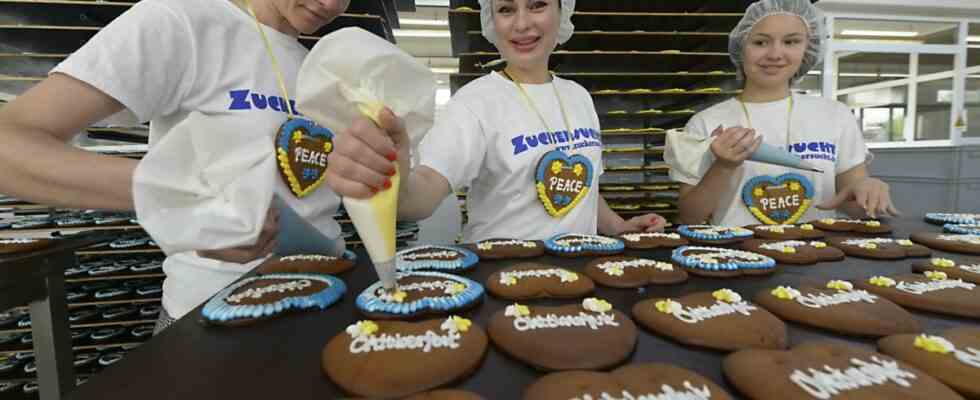You can smell the large confectionery Zuckersucht in Aschheim from 100 meters away, the spicy-sweet scent of freshly baked gingerbread is in the air. Thousands and thousands of Oktoberfest hearts will be created here over the next few months, some decorated by refugees from the Ukraine.
For about 20 years, the Aschheim-based company has been supplying the Oktoberfest in Munich with its typical, colorfully decorated gingerbread hearts. The Oktoberfest was canceled two years in a row and the confectionery company reduced its staff from around 150 to 70 employees. Now that production is to be ramped up again, there is a lack of staff and Zuckersucht managing director Bernd Dostler has summarily hired twelve refugee Ukrainian women as full-time workers.
According to Dostler, the contact to the refugees was made by his neighbor, who himself comes from the Ukraine and has been involved in mediating his compatriots to and within Germany since the beginning of the war. “The workers are really happy to have a job and they learn how to label and paint the gingerbread very quickly,” says Dostler. In addition, the women all live in staff apartments above the bakery. If it was up to him, Dostler said, he would hire and house far more Ukrainians. But he still lacks the necessary living space and the waiting times for appointments with the responsible authorities are delaying further employment. Simone Wagner, office manager at Zuckersucht, confirms this: “The Ukrainian women had to wait three to four weeks for an appointment at the immigration office. Only after we wrote to them did we suddenly get an appointment within three to four days.”
Administrative procedures delay the employment of further workers
According to the Federal Ministry of Labor and Social Affairs, Ukrainian refugees can start working as soon as they receive their residence permit. However, this must first be applied for at the responsible immigration office, and the waiting time for an appointment can take up to five weeks. “The bureaucracy is difficult, but our neighbor helps a lot there. He goes with the people to the respective office and also translates for them,” says Dostler. In addition to the intermediary, he emphasizes that the Russian staff in the company especially help with the daily translation. “Our Russian employees translate for the Ukrainians, who all speak Russian. You have to say that Russians and Ukrainians work wonderfully together, at least outside of Russia. We don’t feel the conflict between the two countries.”
On this day, the blue and yellow of the Ukrainian flag are mainly used for the decoration of the hearts.
(Photo: Claus Schunk)
Meanwhile, on the ground floor of the confectionery manufacturer, preparations for the Oktoberfest are in full swing. Around 500,000 Oktoberfest hearts are to be produced this year. Dozens of shelves filled with gingerbread are lined up in the bakery. Bowls of colorful sugar cream pile up on the work surfaces, and on this day the blue and yellow of the Ukrainian flag are predominantly used for the decorations. Three Ukrainian women with hairnets on their heads and nozzles in their hands are standing at a workstation. With a skillful grip, they spread the paste over the still sparse pastries. The three women make an unlikely trio, yet they are close friends.
“When the war is over, people will stay”
At 43, Natalia is the eldest of them. She wears bright pink lipstick, has dyed black hair and has a smile on her face most of the time. She speaks fluent English and translates for the other two. “I’m an economist. I have a higher education,” says Natalia. Mariia, who is eight years her junior, seems reserved next to her outgoing colleague, she doesn’t speak much. But we learn from her that she was a tourism manager before the war. Meanwhile, 20-year-old Kseniia pulls out her smartphone. She prefers to use pictures rather than words to tell the story and searches the internet for a photo that explains her former job. The image of an athlete with a plastic leg appears on the touchscreen. Kseniia’s family owned a company that produces prostheses, Natalia interprets, and she worked there. Three career paths that couldn’t be more different, and yet the three of them now adorn Oktoberfest hearts together.
They all really enjoyed working here, says Natalia on behalf of the other two. “I don’t know how to describe how I feel because it’s very hard for our country. But at the same time we are blessed by God and I’m happy to be here and to be able to work.” Dostler also hears similar things from other refugees who, according to him, now feel very comfortable here. He is convinced: “I have no concerns that I’m just filling in the gaps for a month. When the war is over, the people will stay.”

